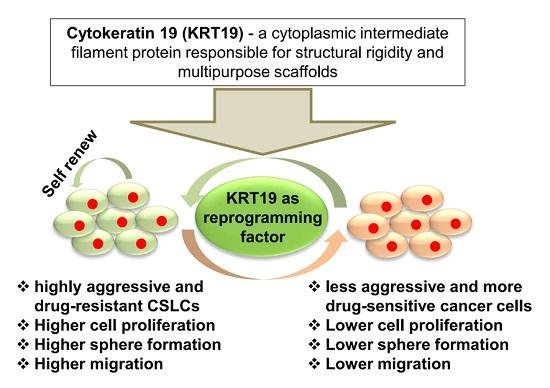What is KRT19 Protein
The Keratin 19 (KRT19) protein, known by its official full name and aliases such as CK19 or cytokeratin-19, is a member of the keratin family. Keratins are structural proteins that form the cytoskeleton of epithelial cells, providing resilience and strength to tissues. KRT19, like other keratins, plays a crucial role in maintaining the structural integrity of cells.

Figure 1. KRT19 as reprogramming factor. (Saha S K, et al., 2018)
KRT19 Protein Structural Characteristics and Classification
KRT19 is a type I intermediate filament protein, characterized by its helical structure. It is encoded by the KRT19 gene located on human chromosome 17. As a member of the keratin family, KRT19 is part of the larger group of intermediate filament proteins that contribute to the structural framework of epithelial cells.
Recent research advances have shed light on the dynamic nature of KRT19. Studies have explored its post-translational modifications, such as phosphorylation and glycosylation, influencing its function and interactions within the cellular environment.
KRT19 Biological Functions and Molecular Mechanisms
The biological functions of KRT19 are multifaceted. Primarily expressed in epithelial tissues, KRT19 provides mechanical support to cells, contributing to the maintenance of tissue architecture. It is a key component of the cytoskeleton, forming intermediate filaments that link cells together and impart structural stability.
Moreover, KRT19 is implicated in cell signaling pathways, influencing cellular processes such as proliferation, migration, and apoptosis. Its versatile functions extend to the regulation of gene expression and the modulation of cellular responses to external stimuli.
KRT19 Related Signaling Pathway
The involvement of KRT19 in signal transduction pathways adds another layer to its significance. Research indicates its association with pathways regulating cell growth, differentiation, and survival. The intricate interplay between KRT19 and signaling cascades highlights its role in orchestrating cellular responses to environmental cues.
KRT19 Related Diseases
Alterations in KRT19 expression and function have been associated with various diseases. In cancer, KRT19 is frequently overexpressed in tumor cells, making it a valuable diagnostic marker for certain types of carcinomas. For instance, its elevated levels have been observed in breast, pancreatic, and lung cancers. Understanding the role of KRT19 in these malignancies provides insights into potential therapeutic targets and prognostic indicators.
KRT19's Applications in Biomedicine
The unique characteristics of KRT19 make it a valuable asset in biomedical applications. Its presence in specific cancer types has made it a reliable diagnostic marker, aiding in the identification and classification of tumors. Diagnostic developments harnessing the specificity of KRT19 are paving the way for more accurate and timely cancer diagnoses.
Beyond diagnostics, KRT19 is a potential target for therapeutic interventions. Researchers are exploring strategies to modulate its expression or activity to impede cancer progression. Moreover, the protein's involvement in signaling pathways opens avenues for the development of targeted therapies that could selectively impact cancer cells while sparing normal tissues.
In the realm of vaccine development, KRT19 may emerge as a candidate for immunotherapy. The exploration of its immunogenic properties could lead to the development of vaccines aimed at stimulating the immune system to recognize and eliminate cancer cells expressing KRT19.
Recommended Products
| Cat.# | Product name | Species | Source (Host) | Tag |
|---|---|---|---|---|
| KRT19-7239H | Recombinant Human KRT19 Protein, His tagged | Human | E.coli | N-His |
| KRT19-244H | Recombinant Human KRT19 Protein, MYC/DDK-tagged, C13 and N15-labeled | Human | HEK293 | C-Myc/DDK |
| KRT19-0025H | Recombinant Human KRT19 Protein | Human | HEK293 cells | |
| KRT19-3140H | Recombinant Human KRT19 Protein (Met1-Leu400), His tagged | Human | E.coli | His |
| KRT19-4394H | Recombinant Human KRT19 Protein (Met1-Leu400), C-His tagged | Human | E.coli | C-His |
| KRT19-1076H | Recombinant Human KRT19 Protein, His-tagged | Human | E.coli | N-His |
| KRT19-4395H | Recombinant Human KRT19 Protein (Glu80-Pro241), N-GST tagged | Human | E.coli | N-GST |
| KRT19-5930HF | Recombinant Full Length Human KRT19 Protein, GST-tagged | Human | In Vitro Cell Free System | GST |
| KRT19-4396H | Recombinant Human KRT19 Protein (Met1-Leu400), C-His tagged | Human | E.coli | C-His |
| Krt19-237M | Recombinant Mouse Krt19 protein, His-tagged | Mouse | E. coli | His |
Reference
- Saha S K, et al. Cytokeratin 19 (KRT19) has a role in the reprogramming of cancer stem cell-like cells to less aggressive and more drug-sensitive cells. International Journal of Molecular Sciences, 2018, 19(5): 1423.

